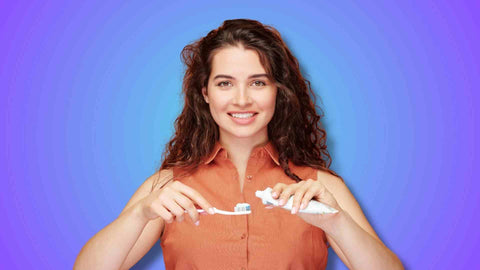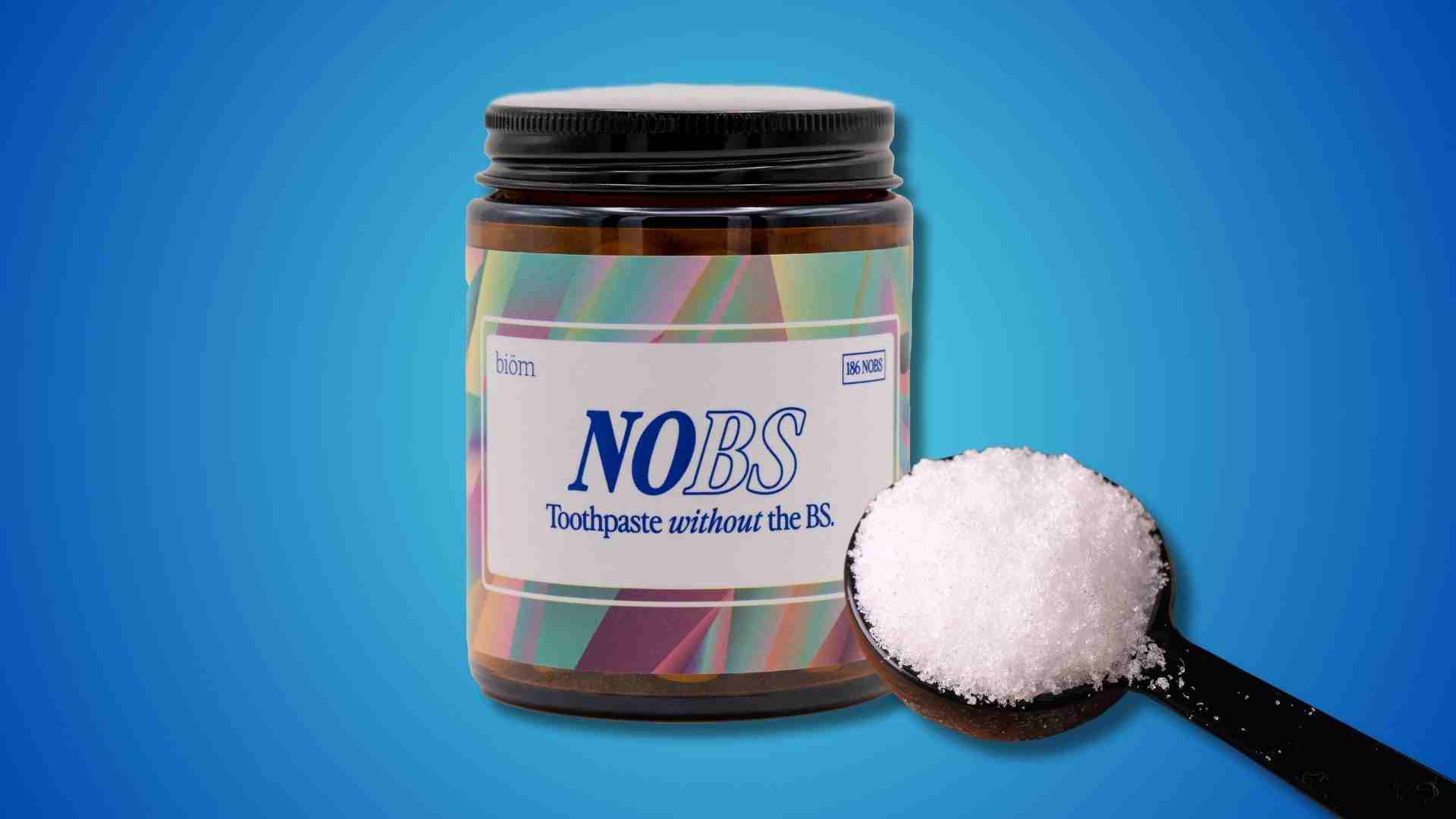Is Xylitol Good for Your Teeth?
Yes, xylitol is good for your teeth.
This natural sugar substitute, found in many fruits and vegetables, offers several benefits for oral health, making it a valuable addition to your dental care routine. Unlike artificial sweeteners, xylitol is a natural sugar derived from plants and is known for its slow absorption rate and benefits for diabetic patients.
In fact, xylitol supports your oral health by:
-
promoting saliva production
-
balancing pH levels
-
fighting demineralization
-
supporting enamel remineralization
-
and improving oral hygiene.
Therefore, incorporating xylitol into your daily oral hygiene routine can significantly improve your dental health and help prevent tooth decay.
Whether through xylitol-containing toothpaste, mouthwash, or chewing gum, this natural sweetener offers a simple yet effective way to protect your teeth and maintain a healthy smile.
Keep reading to learn everything you need to know about the benefits of xylitol for your teeth.
First, what is xylitol in toothpaste?

Xylitol toothpaste is a type of dental care product that incorporates xylitol as a key ingredient. Why xylitol?
Well, xylitol is a sugar alcohol used as a natural sweetener and for oral health benefits. As an FDA-approved natural sugar substitute, xylitol in toothpaste doesn’t contribute to cavities. Instead, it actively combats the growth of cavity-causing bacteria in our mouths, particularly mutans streptococci, and is known for its efficacy at preventing dental caries.
S. mutans is the bacteria responsible for producing the acidic by-products that lead to tooth decay. Xylitol works by inhibiting these bacteria, thereby reducing dental plaque formation and lowering your risk of dental cavities.
In addition to its antibacterial properties, xylitol also enhances saliva production, which is important for maintaining oral health. Increased saliva flow helps neutralize acids in our mouths, wash away food debris, and facilitates enamel remineralization, which can further protect against demineralization decay.
In addition to toothpaste, you can also find xylitol in other oral health products, like xylitol chewing gum and breath mints which can prevent tooth decay.
Does xylitol toothpaste work?
Yes, xylitol toothpaste works effectively for several reasons related to our oral health. Xylitol, a natural sugar alcohol found in many fruits and vegetables, is used in toothpaste primarily for its ability to combat cavity-causing bacteria and promote saliva production.
You see, unlike regular sugar, xylitol doesn't feed the harmful bacteria in your mouth. Instead, it inhibits the growth of Streptococcus mutans, the key bacteria involved in tooth decay and plaque formation. By reducing harmful bacteria, xylitol helps decrease your risk of dental cavities.
Further, xylitol increases saliva production which plays a key role in neutralizing acids produced by bacteria, washing away food particles, and supporting remineralization. This natural process protects us against tooth decay and strengthens teeth.
Additionally, because xylitol is a sweetener, it makes toothpaste more palatable without the negative effects of sugar, enhancing the appeal of brushing.
Finally, studies have shown that regular use of xylitol-containing toothpaste can lead to a significant reduction in tooth decay and improvement in oral hygiene. Similarly, research shows xylitol gum can fight tooth decay and dental caries.
How is xylitol good for your teeth?
Xylitol is good for your teeth as it serves as a healthier alternative to sugar.
Unlike sugar, xylitol is a natural sweetener that has been shown to offer several dental health benefits. Here’s how xylitol contributes to your oral health:
-
Reduces Tooth Decay: Xylitol helps reduce the growth of harmful bacteria in the mouth that cause tooth decay. It does this by inhibiting the bacteria’s ability to produce acid, which can erode tooth enamel and lead to cavities.
-
Promotes Remineralization: Xylitol increases saliva production, which helps to neutralize acids and promotes the remineralization of tooth enamel. This can help repair early damage from tooth decay and strengthen teeth.
-
Reduces Plaque Formation: Studies have shown that xylitol can reduce plaque formation on teeth. Plaque is a sticky film of bacteria that forms on teeth and can lead to gum disease and cavities. By decreasing plaque, xylitol supports overall oral hygiene.
-
Improves Oral Moisture: Xylitol’s ability to increase saliva flow helps keep the mouth moist, which is particularly beneficial for individuals suffering from dry mouth. Saliva is essential for cleaning the mouth and maintaining oral health.
-
Neutralizes Mouth Acidity: Xylitol can help balance the pH levels in the mouth. A balanced pH level reduces the risk of cavities and helps maintain a healthy oral environment.
-
Supports Gum Health: Some studies suggest that xylitol may help in reducing gum inflammation and improving gum health, contributing to overall oral hygiene.
To get the most benefits from xylitol, you can use products such as xylitol-sweetened gum, mints, xylitol mouth rinse, or toothpaste. Sugar free chewing gum, in particular, is beneficial as it helps prevent tooth decay and improves dental health.
Incorporating xylitol into your oral care routine, along with regular brushing and flossing, can help you maintain healthier teeth and gums.
Is xylitol toothpaste safe for daily use?

Yes, xylitol toothpaste is generally safe for daily use.
Xylitol is a natural sweetener that has been shown to offer dental benefits, such as reducing cavity-causing bacteria and promoting a healthy pH balance in the mouth.
Most xylitol toothpastes are formulated to be used twice a day, just like regular toothpaste. They are designed to be gentle on your teeth and gums while providing effective oral care.
However, it’s important to choose a xylitol toothpaste that also contains nano hydroxyapatite, as nHA is essential for strengthening tooth enamel and preventing tooth decay in most safe and effective way.
Additionally, if you have specific dental concerns or conditions, it’s a good idea to consult with your dentist to ensure that xylitol toothpaste is the right choice for your oral health needs.
Is xylitol toothpaste suitable for children?
Yes, xylitol toothpaste is suitable for children, and it can be a great choice for their oral care routine.
Xylitol is a natural sweetener that helps combat tooth decay and improve dental health, making it a safe and effective option for kids.
Xylitol toothpaste, especially when combined with other beneficial ingredients like nano hydroxyapatite, offers a range of advantages for children's dental health.
For example, NOBS Kid’s Jr. Toothpaste is specifically designed for young teeth and includes both xylitol and nano hydroxyapatite. This combination helps remineralize enamel, strengthen teeth, and fights demineralization from a young age.
Additionally, xylitol helps reduce cavity-causing bacteria and promotes overall oral health, making it a suitable choice for your kids' daily dental care.
So, when choosing a toothpaste for children, it’s important to look for products that are fluoride-free, as excessive fluoride can be harmful to young children.
Always ensure that the toothpaste you select is age-appropriate and consult with a pediatric dentist to find the best dental care products for your child.
How does xylitol prevent tooth decay?

Xylitol can help prevent tooth decay by fighting the primary culprits of decay: harmful bacteria in your mouth.
When you use products containing xylitol, such as toothpaste or gum, you’re actively reducing the presence of these bacteria and protecting your teeth.
Chewing xylitol gum is particularly effective in reducing salivary and plaque S. mutans levels, decreasing caries incidence, and promoting remineralization of tooth enamel.
Xylitol works by inhibiting the growth of Streptococcus mutans, the bacteria that play a significant role in tooth decay. Unlike regular sugar, which these bacteria metabolize into acid that erodes tooth enamel, xylitol doesn’t provide a food source for them.
This reduction in acid production helps protect your enamel from decay.
Additionally, xylitol boosts saliva production, which is crucial for neutralizing acids, washing away food particles, and delivering minerals that help repair and strengthen our enamel.
Benefits of Xylitol for Your Oral Health

Xylitol offers many benefits for our oral health, making it a standout ingredient in toothpaste, chewing gums, and other dental care products. Let’s walk through 5 of the most important benefits together.
Prevents Cavities
One of the most celebrated benefits of xylitol is its ability to prevent cavities.
Xylitol works by inhibiting the growth of Streptococcus mutans, a cariogenic bacteria primarily responsible for tooth decay. Unlike regular sugars that feed harmful oral bacteria, xylitol can't be metabolized by these bacteria, thereby reducing their growth and the acids they produce that wear away at enamel.
Research suggests that regularly using xylitol toothpaste can significantly lower your risk of developing dental cavities, offering a proactive approach to oral health.
Reduces Plaque
Plaque buildup is a major contributing factor to dental health issues, including cavities and gum disease. Thankfully, xylitol is known for its ability to reduce the amount of plaque-forming bacteria in our mouths.
Since xylitol doesn't serve as a food source for these bacteria, their ability to stick to teeth and form plaque is diminished. This process helps keep your teeth cleaner and healthier, reducing the likelihood of oral health problems down the line.
Enhances Saliva Production
Saliva is a natural defense mechanism against tooth decay, and xylitol helps enhance its production. By stimulating saliva flow, xylitol helps neutralize acids in the mouth, washing away food particles, and keeping the mouth moist.
This increased saliva production is particularly beneficial for those of us suffering from dry mouth, a condition that can increase the risk of tooth decay and gum disease.
Remineralizes Teeth
Remineralizing teeth is one of the most important benefits of xylitol. Your saliva, stimulated by xylitol is rich in important minerals like calcium and phosphate which your body uses to remineralize, repair, and strengthen your enamel.
This process not only reverses tooth decay but also fortifies your teeth against future erosion.
Tastes Great
Beyond its health benefits, xylitol is naturally sweet and adding it to toothpaste makes it more enjoyable to brush with, especially for children and those who are sensitive to the taste of traditional toothpaste.
This pleasant taste encourages regular brushing and contributes to better oral hygiene without the negative effects of sugar.
Side Effects of Xylitol Toothpaste

While xylitol toothpaste is widely regarded for its oral health benefits, there are a few potential side effects to be aware of. Let's walk through some of the potential consequences of xylitol, largely related to gastrointestinal effects and its impact on individuals with certain sensitivities.
Gastrointestinal Discomfort
Xylitol can cause gastrointestinal discomfort for some people, especially when swallowed in large quantities.
This is because xylitol is a sugar alcohol, which can be difficult for the body to digest if consumed in significant quantities. Symptoms may include bloating, gas, and diarrhea.
However, the amount of xylitol present in toothpaste is typically small, and since you don't ingest toothpaste, this side effect is more commonly associated with xylitol in food products rather than in dental care products.
Allergic Reactions
Although rare, some individuals may experience allergic reactions to xylitol. Symptoms could include itching, swelling, or irritation in the mouth or throat.
Anyone known to have allergies to sugar alcohols or specific sensitivities should proceed with caution and consult their dentist if they suspect an allergic reaction to xylitol toothpaste.
Toxicity in Pets
It's important to note that while xylitol is safe for human use, it is highly toxic to dogs and certain other pets. Even small amounts can cause hypoglycemia (low blood sugar), seizures, liver failure, or even death in dogs. Therefore, you should keep products containing xylitol, including toothpaste, out of reach of pets.
Does xylitol remineralize teeth?
Yes, xylitol does remineralize teeth. In addition to preliminary evidence that xylitol remineralizes teeth on its own, xylitol also indirectly enhances the remineralization process by creating an alkaline environment in the mouth that is conducive to remineralization.
It does so by reducing the levels of decay-causing bacteria and not providing the fermentable sugar those bacteria need to produce harmful acids. This reduction in acid supports healthy pH balance which we need for minerals like calcium and phosphate to be deposited into tooth enamel.

Further, xylitol in toothpaste stimulates saliva production, which is a natural defense mechanism against tooth decay. Saliva not only helps to wash away food particles and bacteria but also brings more remineralizing minerals in contact with the enamel.
This process supports the repair of early enamel lesions and prevents the progression of tooth decay. That said, xylitol cannot reverse cavities.
Finally, studies also show that xylitol can enhance the remineralization effect of remineralizing toothpaste, such as nano hydrpxyapatite or fluoride toothpaste.
How often should I use xylitol toothpaste?
Xylitol toothpaste should be used as part of your daily oral hygiene routine, ideally twice a day, in the morning and before bed.
Regular use of xylitol toothpaste helps maintain oral health by reducing cavity-causing bacteria and promoting a neutral pH balance in the mouth.
For the best results, brush for at least two minutes each time with a piece of xylitol toothpaste tablets and incorporate xylitol into your daily routine alongside regular flossing, tongue scraping, and mouth washing.
Consistent, frequent use of xylitol products is key for improving dental health and preventing oral problems.
Frequently Asked Questions
Do dentists recommend xylitol?
Yes, many dentists, including those practicing pediatric dentistry, recommend xylitol as part of a comprehensive oral care routine. Studies suggest that xylitol can help reduce the risk of cavities by inhibiting harmful bacteria and promoting saliva production, which aids in remineralization. Dentists often advise using xylitol-containing products, such as chewing gum or toothpaste, to enhance dental health and prevent tooth decay.
Can xylitol rebuild teeth?
Xylitol cannot rebuild teeth, but it can help protect and maintain tooth health. It inhibits the growth of harmful bacteria that cause cavities, reducing the risk of tooth decay. Additionally, xylitol stimulates saliva production, which helps remineralize tooth enamel and maintain a healthy oral environment. While it doesn't directly rebuild teeth, it supports overall dental health and helps prevent further damage.
What are the negative effects of xylitol?
While xylitol is generally safe for most people, it can have some negative effects, especially when consumed in large quantities. Common side effects include digestive issues such as gas, bloating, and diarrhea due to its laxative effect. In some rare cases, people may experience an allergic reaction. Additionally, xylitol is extremely toxic to dogs, even in small amounts, and can cause severe hypoglycemia and liver damage. Therefore, it's essential to keep xylitol-containing products out of reach of pets.
Is xylitol safe for daily use?
Yes, xylitol is generally safe for daily use. It is commonly used in various oral care products like toothpaste, mouthwash, and chewing gum, as well as in foods as a sugar substitute. However, consuming large amounts can lead to digestive issues such as bloating, gas, and diarrhea due to its laxative effect. As always, it's a good idea to consult with a healthcare provider if you have any concerns or specific health conditions. Additionally, remember to keep xylitol away from pets, as it is highly toxic to them.
Can I chew xylitol gum all day?
Chewing xylitol gum all day is generally safe for most people, but it's important to do so in moderation. While xylitol gum can help reduce cavity-causing bacteria and promote oral health, excessive consumption might lead to digestive issues like gas, bloating, or diarrhea. Chewing a few pieces of gum throughout the day can be beneficial, but it's best to avoid overdoing it. Additionally, remember that xylitol is highly toxic to dogs, so keep the gum out of their reach. If you have any concerns or experience discomfort, consult your dentist or healthcare provider.
Is xylitol actually good for teeth?
Yes, xylitol is beneficial for teeth as it helps prevent tooth decay by reducing the levels of harmful bacteria in the mouth. Unlike sugar, xylitol is not fermented by oral bacteria, which means it does not produce acids that can erode tooth enamel. Additionally, xylitol stimulates saliva production, which aids in neutralizing acids and remineralizing teeth, contributing to overall oral health.
How long does it take for xylitol to work on teeth?
Xylitol begins working immediately by reducing acid levels and harmful bacteria in the mouth. Regular use over weeks to months may lead to noticeable improvements in cavity prevention and overall oral health. Consistent use is key to seeing long-term benefits.
When is the best time to use xylitol?
The best time to use xylitol is after eating or drinking, as it helps neutralize acids and protect your teeth from plaque buildup. It’s especially effective when used as part of your daily oral hygiene routine. Using xylitol before bedtime can also be beneficial, as it helps keep the mouth clean overnight.
Is it OK to have xylitol everyday?
Yes, it is generally safe to consume xylitol every day in moderation. Studies suggest that regular use of xylitol can improve oral health by reducing cavities and plaque buildup. However, excessive consumption may cause digestive issues like gas or bloating, so it's best to use it in moderation.






















